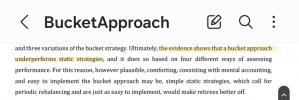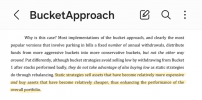Steven, I had my pension blinkers on and wandered off topic. Which was general bucket strategy and financial management.Back to the OP, it is basic planning
Some people need to segment money for different needs., like keeping money for children's education separate to the excess cash investment account. There is no need to do this but if it makes you feel more comfortable with your finances, then go for it, it's not the end of the world. Having two accounts instead of one isn't the end of the world. It's the people who have none that is the issue.
- Cash account for cashflow purposes
- Investment account for medium term expenses. This can be anything from paying for education expenses or anything other expense you may have before retirement
- Pension for long term wealth
- Use the investment account in point 2. for other excess cash
All investment accounts should be equity based primarily. This is where your growth is going to come from. Add in bonds to reduce volatility as per your tolerance.
Steven
http://www.bluewaterfp.ie (www.bluewaterfp.ie)
Apologies to OP, theObserver.

